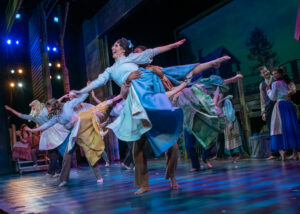
Photos by Amy Pasquantonio
By Britin Haller
As decades pass over many works of art, it’s not realistic to expect that the public’s perception of them always will remain unchanged. To appreciate them, we may need to knowingly view them from an intentionally outdated socially-accepted viewpoint – or even better to compare the underpinnings of the venerable piece with evolutions in changes in today’s social mores.
Exhibit one at the Wick Theatre: Rodgers and Hammerstein’s 1945 Carousel is inarguably a beloved masterpiece musical oft-revived — with rare inescapable darker aspects drawn from Molnar’s 1909 tragedy.
If it has been a while since you’ve seen this musical – or if you’ve only heard about its reputation — don’t expect a rom-com, or a happy circus show full of love and laughs. Rather, be prepared for a dark depressing plot set in 1873 where the main characters experience and participate in domestic abuse, robbery, suicide, and the loss of a parent, with some inarguably toe-tapping production numbers thrown in for good measure.
The great Stephen Sondheim is quoted comparing the duo’s first two major popular triumphs: “Oklahoma! is about a picnic. Carousel is about life and death.” If you think having the names Rodgers and Hammerstein attached to a project necessarily equates to it being light and airy, think again, and be prepared to descend into the darkness of the abyss instead.
As the story goes, composer Richard Rodgers and lyricist-book writer Oscar Hammerstein II had a heck of a time getting to opening night, because everyone, including moviemaker Samuel Goldwyn who told Rodgers to just shoot himself now, knew Oklahoma! was going to be a hard act to follow. Despite all that, they persevered, presenting to the world what Rodgers ultimately considered to be his best score ever.
The setting is a waterfront town in Maine, so not surprisingly clams play a big part here, and a song called “A Real Nice Hayride” (written for Oklahoma! but not used) cleverly became “A Real Nice Clambake.”
Despite roadblock after roadblock, Carousel finally opened on April 19, 1945 to large crowds and enthusiastic critics. The Tony Awards weren’t around yet, so it couldn’t be judged by that measure, but its tragic story was worthy of a statue featuring both a smiling face (comedy) and a sad one (tragedy). Mostly the sad face. Carousel became a 1956 film starring Gordon MacRae and Shirley Jones, and had multiple Broadway revivals finally resulting in several Tonys, including Best Musical.
Presenting these older shows is tricky, as in the Wick’s recent production of Bye Bye Birdie, as the themes do not often hold up well in today’s climate, where as a society we know better, or are supposed to. Executive Managing Producer Marilynn A. Wick addresses this in her latest message to her patrons. She says, “Good guys can sometimes be bad. And life isn’t always so cut-and-dry. I’ve learned so much from these rich, flawed, and complicated characters, but I am also reminded of just how crucial forgiveness is. In today’s similarly complicated times, I hold hope we give each other grace and the opportunity for redemption.”
It’s a catch-22. On the one hand, we lose a lot to history if we forego these classics due to the archaic way the characters thought, on the other hand, entertainment from the past often needs to come with trigger warnings for today’s audiences.
Director Jeffry George, who earned his stripes as a dancer and musician in college, says “Carousel set the foundation for all Broadway musicals to inevitably take.” Time Magazine even named the show the Best Musical of the 20th Century. Of course, art is subjective and in the eye of the beholder.
 Carousel tells the tale of young millworker Julie Jordan and travelling carnival barker Billy Bigelow who literally go from flirting on the carnival ride to discussing marriage all in the same night. Love at first sight has nothing on them. Their meet-cute called “The Carousel Waltz” is lovely, and as Billy does his best barker act, Julie grows more and more mesmerized, to the point where they both end up losing their jobs. Before we know it, Billy and Julie are married, and he’s hitting her, off-stage thankfully. He’s also a bum who can’t hold down a job and really doesn’t want to, so he gets talked into committing a robbery by his best friend, Jigger.
Carousel tells the tale of young millworker Julie Jordan and travelling carnival barker Billy Bigelow who literally go from flirting on the carnival ride to discussing marriage all in the same night. Love at first sight has nothing on them. Their meet-cute called “The Carousel Waltz” is lovely, and as Billy does his best barker act, Julie grows more and more mesmerized, to the point where they both end up losing their jobs. Before we know it, Billy and Julie are married, and he’s hitting her, off-stage thankfully. He’s also a bum who can’t hold down a job and really doesn’t want to, so he gets talked into committing a robbery by his best friend, Jigger.
Meanwhile, Julie’s best friend, Carrie, is having men issues of her own vacillating between the lovely, enterprising although controlling, Mr. Snow, and the seedy bad-boy Jigger.
The rest of the story can’t be revealed here without giving spoilers, but in a nutshell, in Act II, a plan goes terribly awry, and the townsfolk must deal with the consequences.
Cheers to the following…
As an actor, there can’t be many tougher roles than Billy Bigelow, the arrogant aggressive jerk who wears the same clothes throughout. Why even Billy’s redemption arc comes across as anything but altruistic. Trevor Martin’s classic training as a vocalist comes in handy here especially in Billy’s big moment, “Soliloquy” a lengthy sung/spoken number where Billy seemingly grows up, only for us to later realize his epiphany rang on deaf ears, especially his own. Along with the wonderful sounds of the orchestra’s strings and horns under the capable direction of Bobby Peaco, Trevor excels here with a gorgeous baritone vibrato reminiscent of Robert Goulet in Camelot.
Julia Suriano as Julie Jordan wrings her hands appropriately, but it’s hard to feel anything but distaste for a woman who allows herself to be abused by a good-for-nothing rogue, even if she is a poor mill worker who has few other choices in the romance department. Along with Martin as Billy, their famous, or infamous depending on how you look at it, “Bench Scene” showcases their talents in the stirring ballad “If I Loved You.”
Wick season-ticket holders will recognize Mallory Newbrough as Carrie, the fickle, but fun, young woman who isn’t sure if she wants to be tied down, but knows a good man when she sees one. Her showcase musical number “Mister Snow” is precious, as is the reveal of how that all turns out. Suffice it to say, thank goodness for child wrangler Britte Steele because Maria in The Sound of Music has nothing on Carrie.
Sean Birkett is a novice to the Wick stage, but after his performance as the completely charming fisherman Enoch Snow who has his and Carrie’s whole lives planned out for them, there’s no doubt Birkett will be invited to return. His duet with Newbrough “When the Children are Asleep” is a real people-pleaser, and when he performs “Geraniums in the Winder,” Birkett steals your heart.
Popular, and always reliable, Wick actors Billy Vitucci and Colleen Pagano return as the wealthy mill owner Mr. Bascombe and the widowed and desperate carousel owner Mrs. Mullin. Taking on dual roles of the Starkeeper and Dr. Selden is Michael H. Small who does a fine job portraying the benevolence of each, particularly Dr. Selden’s moving speech in the final scene.
Dalia Aleman is also a regular at the Wick for good reason. As Julie’s cousin and mother figure Nettie Fowler, she puts her soprano vibrato to good use in the stair-stepping and chilling “You’ll Never Walk Alone.” It takes guts to take on such an iconic song that is full of so many big notes.
Larry Buzzeo as comic relief Jigger Craigin gets some of the only laughs of the night as he awkwardly tries to seduce Carrie with lines like “Why, just to see your lovely smile, I’d swim through beer with my mouth closed.”
Abigail Marie Curran plays the lovely waif daughter, Louise. Curran is an exceptional dancer, and along with Josh Beaver, performs a must-see ballet in “Ballet” that is meant to take your breath away.
Co-costumers Judy Chang and Alan Wilson had their work cut out for them outfitting the largest cast the Wick has ever seen. Stand-outs are Mrs. Mullin’s corseted gowns and the simple and ethereal pink dress Louise wears to dance.
And of course, any review of any production of this particular show would not be complete without mentioning the scenic, lighting, sound, and projection designers who must work in tandem to produce the experience that is Carousel. Jack Golden, Clifford Spulock, Hana Suarez, and Kacey Koploff tackle those jobs spectacularly.
There are wonderful ensemble numbers from choreographer Simon Coulthard and dance captain Melanie Farber including “Blow High, Blow Low.” Jawan Hayes is the one to watch here as he performs seemingly effortless gravity-defying lifts. And how adorable is eight-year-old Luke Greyson Sargent? Just try taking your eyes off him whenever he’s on stage.
When it’s all said and done, questions still remain like why is it called Carousel when we only see one once? And why did Julie stay with a man with the mentality of a five-year-old? And was anyone else today years old when they realized the well-known vocal number “June is Busting Out All Over” is actually a bunch of young folk singing about having a roll in the hay?
But despite all that, seeing a historical show that’s been around in one form or another for over 75 years is good for the soul, so get yourself to the Wick before this legendary classic full of spectacular dance and music waltzes away. Arrive early, and enjoy the working merry-go-round out in front of the theatre for rides and photos.
Britin Haller is the Senior Editor for Charade Media. Her latest novel is Dumpster Dying by Michelle Bennington, available where books are sold. Find Britin across social media and at Charadebooks.com
Carousel plays through March 24 at The Wick Theatre 7901 N. Federal Highway, Boca Raton FL; 7:30 p.m. Thurs-Sat; Matiness 2 p.m. Wed, Thurs, Sat & Sun. Running time approx. 155 minutes with a brief intermission. Tickets starting at $79. Call 561-995-2333, or visit thewick.org.









 A PaperStreet Web Design
A PaperStreet Web Design
